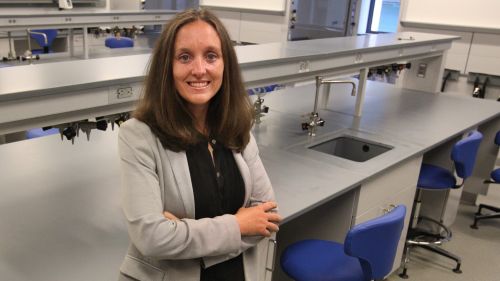
Kelsey Hatzell. Photo by Frank Wojciechowski
Catherine Zandonella, Office of the Dean for Research
August 21, 2023
Kelsey Hatzell has been awarded funding via the Dean for Research Innovation Fund for Exploratory Energy Research for a project that propels investigations in sustainable energy generation and storage. Her project was one of two selected following a competitive application process.
An assistant professor of mechanical and aerospace engineering and the Andlinger Center for Energy and the Environment, Hatzell is a specialist in solid-state batteries.
The Exploratory Energy fund exemplifies the University’s commitment to support innovative curiosity-driven energy research that is critical to securing a sustainable shared future. The Innovation Fund for Exploratory Energy Research is part of the larger Energy Research Fund. The Office of the Dean for Research oversees funding for fundamental energy research projects, and the Andlinger Center for Energy and the Environment distributes funding for research projects in collaboration with corporate partners.
Inorganic membranes for high density flow batteries for grid energy storage
With rising use of sustainable sources of power such as wind and solar energy, the need for long-term electricity storage is greater than ever. Batteries that can store large amounts of electricity for greater than six hours remain a critical bottleneck for the transport and production of sustainable power.
Hatzell and her team will explore ways to improve a promising energy storage system called the redox flow battery. Unlike conventional batteries, which store energy in the batteries’ electrodes, redox flow batteries store energy in a fluid. The fluid can be placed in external tanks, providing long-duration storage of electricity.
Hatzell will explore ways of overcoming one of the major challenges in developing redox flow batteries, the cross-contamination of materials between the battery’s electrodes, which weakens the ability of the battery to store electricity. Hatzell proposes to create new solid membranes that can prevent this cross-over. The resulting membrane can then be incorporated into a low cost, high-density battery that uses a liquid electrolyte to provide long-term energy storage.